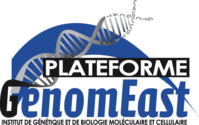Hypoxia-inducible factor 1A inhibition overcomes castration resistance of prostate tumors
Résumé
Androgen deprivation therapy (ADT) is a cornerstone of prostate cancer (PCa) management. Although tumors initially regress, many progress to a hormone-independent state termed castration-resistant PCa (CRPC), for which treatment options are limited. We here report that the major luminal cell population in tumors of Pten(i)pe-/- mice, generated by luminal epithelial cell-specific deletion of the tumor suppressor PTEN after puberty, is castration-resistant and that the expression of inflammation and stemness markers is enhanced in persistent luminal cells. In addition, hypoxia-inducible factor 1 (HIF1) signaling, which we have previously demonstrated to be induced in luminal cells of Pten(i)pe-/- mice and to promote malignant progression, is further activated. Importantly, we show that genetic and pharmacological inhibition of HIF1A sensitizes Pten-deficient prostatic tumors to castration and provides durable therapeutic responses. Furthermore, HIF1A inhibition induces apoptotic signaling in human CRPC cell lines. Therefore, our data demonstrate that HIF1A in prostatic tumor cells is a critical factor that enables their survival after ADT, and identify it as a target for CRPC management.
| Origine | Fichiers éditeurs autorisés sur une archive ouverte |
|---|
